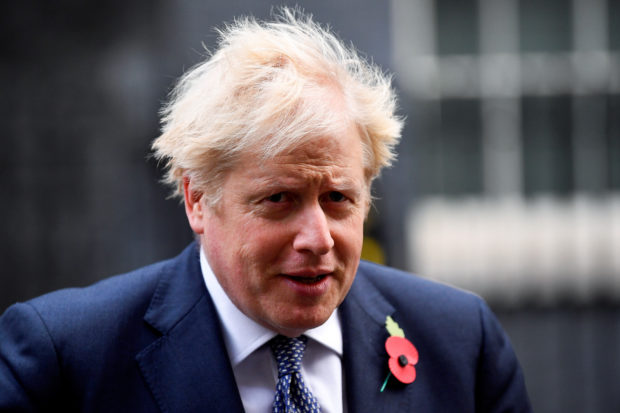G7 to donate 1 billion COVID-19 vaccine doses to poorer countries

FILE PHOTO: Britain’s Prime Minister Boris Johnson leaves Downing Street to attend a cabinet meeting at the Foreign and Commonwealth Office (FCO) in London, Britain November 10, 2020. REUTERS/Toby Melville/File Photo
CARBIS BAY, England — British Prime Minister Boris Johnson expects the Group of Seven to agree to donate 1 billion COVID-19 vaccine doses to poorer countries during its summit starting on Friday, and help inoculate the world by the end of next year.
Just hours after U.S. President Joe Biden vowed to supercharge the battle against the coronavirus with a donation of 500 million Pfizer shots, Johnson said Britain would give at least 100 million surplus vaccines to the poorest nations.
Johnson has already called on G7 leaders to commit to vaccinate the entire world by the end of 2022 and the group is expected to pledge 1 billion doses during its three-day summit in the English seaside resort of Carbis Bay.
Some campaign groups condemned the plan as a drop in the ocean, with Oxfam estimating that nearly 4 billion people will depend on COVAX for vaccines, the program that distributes COVID-19 shots to low and middle income countries.
“As a result of the success of the UK’s vaccine program we are now in a position to share some of our surplus doses with those who need them,” Johnson will say on Friday, according to excerpts of the announcement released by his office.
Article continues after this advertisement“In doing so we will take a massive step towards beating this pandemic for good.”
Article continues after this advertisementCOVID-19 has killed around 3.9 million people and ripped through the global economy, with infections reported in more than 210 countries and territories since the first cases were identified in China in December 2019.
While scientists have brought vaccines to market at breakneck speeds – Britain has given a first dose to 77% of its adult population and the United States 64% – they say the pandemic will only end once all countries have been vaccinated.
With a global population nearing 8 billion and most people needing two doses, if not booster shots to tackle variants as well, campaigners said the commitments marked a start but world leaders needed to go much further, and much faster.
“The G7’s aim to provide 1 billion doses should be seen as an absolute minimum, and the timeframe needs to speed up,” said Lis Wallace at anti-poverty campaign group ONE.
“We’re in a race with this virus and the longer it’s in the lead the greater the risk of new, more dangerous variants undermining global progress.”
Of the 100 million British shots, 80 million will go to the COVAX program led by the World Health Organization (WHO) and the rest will be shared bilaterally with countries in need.
Johnson echoed Biden in calling on his fellow leaders to make similar pledges and for pharmaceutical companies to adopt the Oxford-AstraZeneca model of providing vaccines at cost for the duration of the pandemic.
Leaving poorer countries to deal with the pandemic alone risks allowing the virus to further mutate and evade vaccines. Charities have also said that logistical support will be needed to help administer large numbers of vaccines in poorer countries.
The British doses will be drawn from the stock it has already procured for its domestic program, and will come from suppliers Oxford-AstraZeneca, Pfizer-BioNTech, Janssen, Moderna and others.